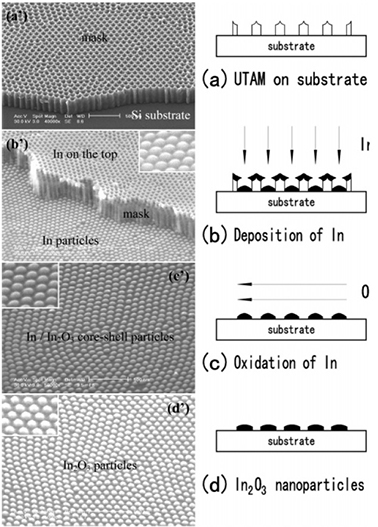Fabrication of highly ordered arrays of metal/semiconductor core-shell nanoparticles
Core-shell nanoparticles have been the subject of extensive research due to their potential application in many areas such as microelectronics, optoelectronics, catalysis, and optical devices. In 2005, Yong Lei and Wai-Kin Chim reported the fabrication of highly ordered indium oxide coated indium highly ordered indium oxide coated indium on Si substrates using a three-step oxidation process. First is the preparation of an AAO on the surface of the substrate (Fig. 1a). After the deposition of In (Fig. 1b), the AAO is removed, leaving a highly ordered In nanoparticle array on the substrate. Then, the transformation of In nanoparticles to In/In2O3 Core-shell nanoparticles and In2O3 nanoparticles was realized by a three-step oxidation process (Fig. 1c,d).

Fig. 1 Schematic outline of the fabrication process. (a) ultrathin AAO template on Si substrate. (b) the initial In nanoparticle arrays. (c) In/In2O3 nanoparticle arrays after the temperature ramp process. (d) the final In2O3 nanoparticle arrays.
Reference:
Journal of the American Chemical Society 127, 1487-1492 (2005).
http://www.nature.com/nnano/journal/v3/n7/full/nnano.2008.161.html
